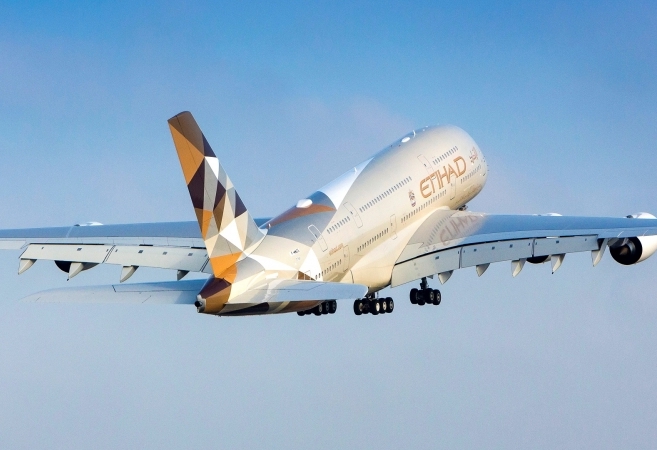
Etihad Aviation Group and Partners to Contribute up to US$9.6 Billion to Abu Dhabi Economy In 2016
Etihad Aviation Group (EAG) and its equity airline partners will provide a contribution of up to US$9.6 billion to the Abu Dhabi economy in 2016, according to figures released today by Oxford Economics Group.
The Group and its partners will deliver a core economic contribution of US$7.4 billion and a tourism contribution of US$2.2 billion, said the report. In turn, they will support 62,100 jobs through core operations, with another 29,600 jobs supported through the tourism contribution.
Further to the economic contribution, the air connectivity offered by Etihad Airways – the national airline of the United Arab Emirates – and its equity airline partners will boost the Abu Dhabi productivity by US$17.0 billion in 2016. This constitutes 5.9 per cent of Abu Dhabi Gross Domestic Product (GDP) and is equivalent to 195,600 jobs in the emirate.
By 2024, the annual contribution to the Abu Dhabi economy from Etihad Aviation Group and its equity airline partners is expected to reach up to US$18.2 billion, including a core contribution of US$12.6 billion and a tourism contribution of US$5.6 billion. The productivity boost from air connectivity impact will reach US$27.1 billion.
The report recognises the central role that Etihad plays, saying: “Etihad’s impact in Abu Dhabi is a vital driver of prosperity for the emirate, the importance of which is set to grow in the next decade as the airline expands its service, bringing more visitors to the region.”
James Hogan, President and Chief Executive Officer of Etihad Aviation Group, said: “Success for Etihad Airways translates directly into success for Abu Dhabi – and success for the wider Group and its partners boosts that impact even further.
“As a major jobs creator and as a major spender with local suppliers, Etihad Aviation Group has had an increasingly positive impact on the Abu Dhabi economy, year after year. These are long term, sustainable jobs which make a long term, sustainable contribution to GDP.
“As our equity airline partners continue to expand their connectivity with Abu Dhabi, we are seeing even greater impacts on the local economy.”
The figures demonstrate the success of Etihad Aviation Group’s equity investment strategy in terms of a positive impact on its home of Abu Dhabi. The core and tourism impacts from the partners will top US$1.1 billion in 2016, growing to US$1.7 billion by 2024, while the productivity boost from connectivity is worth another $1.0 billion.
Etihad Aviation Group was established in 2014, as a key step towards the goal of becoming a wider travel and aviation group, beyond Etihad Airways itself. EAG comprises four business divisions – Etihad Airways, Etihad Engineering, Hala Group and Airline Equity Partners.
In 2015, all these major business streams experienced growth, further contributing to the development of Abu Dhabi.
In 2011, Etihad Airways made its first strategic minority investment in another airline, in airberlin. It now has minority stakes in seven airlines in total. These investments have made a significant impact on Etihad Airways’ business; partnerships delivered five million passengers in 2015, contributing US$1.4 billion in revenues. There are also major cost and business synergies shared with the equity partners.
In addition, Etihad Airways’ investments have helped these airlines improve their own business performance, thanks to recapitalisation, access to wider global networks and cost synergies.
Mr Hogan said: “Our two-pronged approach is delivering results for Etihad Aviation Group and it is delivering results for Abu Dhabi. At a strategic level, our equity partners to bring network connectivity, generate additional revenues and create economies of scale. Every one of our partners is delivering on this level.
“Each partner also has its own business goals, which are the responsibility of their own management and Boards of Directors. Many of these, such as Air Serbia, Air Seychelles, Jet Airways and Virgin Australia, are now delivering profitably on this level.
“Our investment in Alitalia is well on track, cutting losses by more than we planned in our first full year.
“airberlin has faced greater challenges and has taken longer than we expected to reach sustainable profitability, but the underlying fundamentals of the business are trending in the right direction. In addition to the revenue contribution from airberlin to Etihad Airways, which is significant, this Oxford Economics Group study shows that our investment is also having a strong impact on Abu Dhabi.”
Etihad Airways and the airlines in which it holds minority stakes account for a notable share of the international air travel market, making it the seventh largest global grouping. Together, they carry 114.8 million passengers to over 600 unique destinations, on a fleet of 718 aircraft, served by 73,660 employees.



























